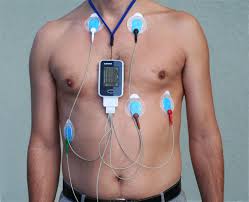Holter Monitoring!
A Holter monitor is a portable, non-invasive device that records a patient’s heart rhythm (ECG) over 24-48 hours.
Purpose:
- Diagnose irregular heart rhythms (arrhythmias).
- Monitor heart function after heart attack or surgery.
- Evaluate symptoms (palpitations, dizziness, syncope).
- Assess pacemaker/implantable cardioverter-defibrillator (ICD) function.
How it works:
- Small electrodes attached to chest.
- Monitor records ECG continuously.
- Patient keeps diary of activities/symptoms.
- Data analyzed to correlate symptoms with heart rhythm.
Types:
- 24-hour Holter monitor.
- 48-hour Holter monitor.
- Extended-wear Holter (up to 7-14 days).
- Mobile cardiac telemetry (MCT).
Preparation:
- No special preparation needed
- Avoid bathing/showering during monitoring
- Wear comfortable clothing
- Continue medications as prescribed
Benefits:
- Accurate diagnosis of arrhythmias
- Identifies correlation between symptoms and heart rhythm
- Guides treatment decisions
- Non-invasive and painless
Common indications:
- Syncope (fainting)
- Palpitations
- Dizziness
- Chest pain
- Shortness of breath
Results interpretation:
- Heart rate/rhythm analysis
- Identification of arrhythmias (e.g., atrial fibrillation)
- Correlation with symptoms
- Recommendations for treatment/further testing
Benefits With Our Service
Our technicians provide continuous recording of the heart’s electrical activity over 24 to 48 hours, capturing irregular heart rhythms that may not appear during a standard ECG. It helps in diagnosing conditions like arrhythmias, palpitations, and unexplained fainting, offering valuable insights into how the heart functions during daily activities.


Health Tips & Info FAQ :
Yes, our in-house medical team consists of highly experienced cardiologists and specialists dedicated to providing the best heart care.
Our skilled cardiac surgeons perform heart transplants with utmost precision and care, ensuring the highest standards of patient safety.
Our experts have extensive experience in determining the right time for mitral valve repair, aiming for optimal heart function and patient outcomes.

